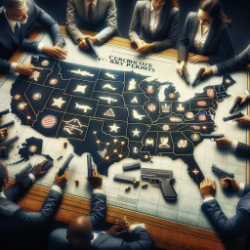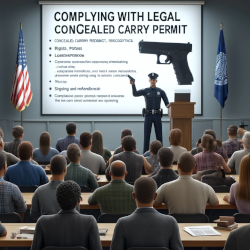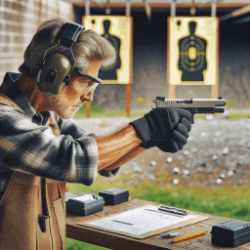
For those of us who cherish the great outdoors, whether it's through hunting, hiking, or simply reveling in the serenity of nature, the knowledge of how to legally carry a concealed weapon is essential. The liberty to wander with a sense of security is something many of us cherish and consider fundamental. Whether you're tracking deer at dawn, setting up camp in the backcountry, or protecting your homestead, a concealed carry weapon (CCW) can be a vital tool for safety and peace of mind. What States Recognize Ccw.
This guide seeks to simplify the complexities surrounding concealed carry permits. It gives a state-by-state overview, critical for understanding diverse and sometimes complicated regulations. Particularly for those in the hunting community or individuals engaged in outdoor pursuits where wildlife encounters could be dangerous, being prepared and compliant with the law is essential. The regulations may vary greatly, mirroring the diversity of landscapes we encounter, with some states having more lenient permit processes, while others, like California, enforce stricter guidelines and requirements. what states recognize ccw.

Additionally, this guide is designed for a diverse audience, including novice gun owners obtaining their first permit and experienced marksmen seeking renewal or comprehension of reciprocity laws across state lines. For DIY enthusiasts working on their property, to adventurers exploring the rugged terrains of America’s parks and forests, understanding how to navigate the legal landscape of concealed carry is equally important as mastering the physical aspect. What States Recognize Ccw.
As we explore this guide, remember that staying informed and compliant with the law allows you to enjoy your outdoor adventures with confidence and security. Whether you're a seasoned hunter with NRA affiliation or someone who enjoys the occasional outdoor excursion, this guide provides the comprehensive overview you need. what states recognize ccw.

A concealed carry permit authorizes individuals to carry a concealed firearm in public legally. Each state establishes its own regulations and standards for issuing these permits, often including background checks, training courses, and an application process. Failure to carry a concealed weapon with one of these permits, where required, can have serious legal ramifications. These permits are crafted not only to ensure public safety but also to uphold the rights of responsible gun owners. As proponents of Second Amendment rights, we understand the significance of these permits in empowering law-abiding citizens to safeguard themselves and their families, especially in uncertain times. It also demonstrates the trust placed in citizens who dedicate themselves to handling firearms with the utmost responsibility and respect for the laws that govern us. what states recognize ccw.

Various states have varying regulations for obtaining a concealed carry permit. For example, Kentucky might impose less strict regulations compared to California, which has stringent requirements and procedures. Understanding the specific laws of your state is crucial for carrying a concealed weapon responsibly and legally. These differences often reflect the local culture and attitudes towards gun ownership and use. As a case in point:
This difference highlights the importance of individuals interested in obtaining a CCW to be knowledgeable about not only their state's laws but also the regulations of any state they intend to visit. The process may be straightforward or complex, depending on your location and experience with firearms, making it essential for potential applicants to thoroughly research and prepare for the requirements they may encounter. what states recognize ccw.

Renewing your CCW permit can sometimes present challenges comparable to obtaining one initially. Most states stipulate a renewal every few years, often necessitating a refresher course or shooting qualification. It's imperative to consult your state’s official resources well in advance of your permit’s expiration to avoid potential legal issues. This diligence is essential because lapses in permit validity can inadvertently lead to legal repercussions, even for law-abiding citizens. Additionally, the renewal process frequently updates you on any changes in gun laws, ensuring ongoing compliance with current regulations. Many states also utilize the renewal process to reevaluate the holder's eligibility, including any criminal activities or mental health concerns that could impact their suitability to carry a concealed weapon. This continual vetting process underscores the commitment to safety and responsible gun ownership. what states recognize ccw.

Reciprocity takes place when one state recognizes the concealed carry permits of another. A number of states recognize California’s CCW, though not all. Before undertaking your journey, make sure to verify the CCW reciprocity agreements between your home state and your travel location to prevent any potential issues. This is essential for people who regularly travel state lines, whether it's for outdoor activities, competitions, or personal reasons. Here are some essential points to keep in mind CCW reciprocity.

This knowledge is crucial for maintaining compliance with different state laws and protecting that your rights are protected while away from home. Understanding and navigating these complexities can help that that your travels are hassle-free. what states recognize ccw.

Obtaining a CCW permit can be expensive and varies greatly depending on your location.These expenses may encompass the application fee, training programs, and sometimes additional costs for fingerprinting or background checks.Always consider these when budgeting for applying for or renewing a CCW permit.Additionally, some states may charge for the renewal process and any legal consultations needed to navigate the application process.Also, consider the cost of the necessary firearms and accessories, such as holsters or safe storage solutions, essential for safely carrying and maintaining a firearm.Also, don't forget to budget for continuous training, as it's essential to remain proficient with your firearm for both safety and compliance. what states recognize ccw.

The application process for a CCW permit varies depending on whether you can apply online or must visit a local sheriff’s office.Usually, it includes submitting an application, completing required training, passing a background check, and paying any applicable fees.Many times, applicants also need to furnish fingerprints and undergo a personal interview to evaluate their motivations for obtaining a CCW and their comprehension of the responsibilities involved.This comprehensive strategy ensures that only qualified individuals are granted the privilege of carrying concealed weapons.For those new to the process, it may be beneficial to consult with legal experts or experienced permit holders to navigate the complexities of state-specific requirements efficiently. what states recognize ccw.

For those of us who take to the woods with a weapon, understanding the legal landscape is essential.This encompasses state laws as well as federal regulations that could impact where and how you carry your concealed weapon.As a member of the NRA and a staunch defender of the Second Amendment, it’s vital to stay informed about:
Navigating these legal waters can be as challenging as the physical terrain we explore.Keeping up with changes in laws and recent court rulings that could affect your rights and responsibilities is crucial for responsible gun ownership.By doing this, you guarantee not only your safety but also the safety of those around you, safeguarding the integrity of the sport and your rights. what states recognize ccw.

Laws around concealed carry are subject to change.Staying informed through resources like the National Rifle Association (NRA) can help ensure compliance with current laws and readiness for any potential changes.Legislative changes can significantly affect the locations and methods of carrying concealed weapons as political climates shift and public opinions change.Here are a few trends and potential future modifications in concealed carry regulations that may affect gun owners:

Through close observation of these advancements, one can adapt to changes and still enjoy their rights under the law. Taking part in advocacy and engaging with firearms rights organizations can also be pivotal in shaping the future of concealed carry regulations. Such proactive engagement ensures that the voices of responsible gun owners are heard in the legislative process, potentially influencing decisions that affect millions of Americans. what states recognize ccw.

There are numerous resources available to aid in obtaining a CCW permit. State government websites typically offer the most direct assistance, while various organizations focused on firearm safety and training also provide valuable guidance. Additionally, many local gun shops and shooting ranges provide classes and can give personalized advice based on their extensive experience with local regulations. They frequently have connections within the local licensing authorities and can provide insight into the nuances of the application process in your area. what states recognize ccw.
For those seeking more structured support, the National Rifle Association (NRA) provides resources such as detailed state-by-state guides to gun laws, legal defense insurance, and updates on legislative changes affecting gun owners. Furthermore, organizations such as the United States Concealed Carry Association (USCCA) offer similar services along with educational programs and legal assistance specifically tailored for CCW permit holders. Using these resources can greatly simplify the process of obtaining and renewing your permit, ensuring you stay informed and compliant with current laws. what states recognize ccw.

Understanding the complexities of concealed carry permits requires attention to detail and a comprehension of ever-changing laws. By staying informed and compliant, you can ensure your security and enjoy your time outdoors without legal worries. Whether you're an experienced hunter or a casual weekend hiker, understanding these laws is a vital part of being a responsible gun owner. what states recognize ccw.
